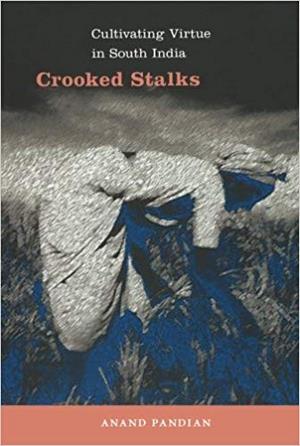Número de ficha: 144636
Me gusta
0
No me gusta
0
Para calificar el registro, es necesario acceder al sistema.
Ir a la página de acceso
- ISBN
- 978-0-8223-4514-5
- 978-0-8223-4531-2
- Clasificación DEWEY
- 306.34909548 PAN-c
- Autor
- Pandian, Anand , autor
- Título
- Crooked stalks : cultivating virtue in South India / Anand Pandian
- Pie de imprenta
- Durham : Duke University Press , 2009
- Descripción
- xiii, 325 páginas : ilustraciones, mapas ; 24 cm.
- Tipo de medio digital o análogo
- sin medio rdamedia
- Medio de almacenamiento
- volumen rdcarrier
- Bibliografía
- Incluye referencias bibliográficas (páginas [289]-307) e índice.
- Nota de contenido
- "A rough spade for a rugged landscape" : on savage selves and more civil places -- "What remains of the harvest when the fence grazes the crop?" : on the proper violence of agrarian citizenship -- "The life of the thief leaves the belly always boiling" : on the nature and restraint of the criminal animal -- "Millets sown yield millets, evil sown yields evil" : on the moral returns of agrarian toil -- "Let the water for the paddy also irrigate the grass" : on the sympathies of an aqueous self.
- Nota de Resumen
- How do people come to live as they ought to live? Crooked Stalks seeks an answer to this enduring question in diverse practices of cultivation: in the moral horizons of development intervention, in the forms of virtue through which people may work upon their own desires, deeds, and habits, and in the material labors that turn inhabited worlds into environments for both moral and natural growth. Focusing on the colonial subjection and contemporary condition of the Piramalai Kallar caste—classified, condemned, and policed for decades as a “criminal tribe”—Anand Pandian argues that the work of cultivation in all of these senses has been essential to the pursuit of modernity in south India. Colonial engagements with the Kallars in the early twentieth century relied heavily upon agrarian strategies of moral reform, an approach that echoed longstanding imaginations of the rural cultivator as a morally cultivated being in Tamil literary, moral, and religious tradition. These intertwined histories profoundly shape how people of the community struggle with themselves as ethical subjects today.
- Fuente de adquisición
- Amazon.com.mx ; compra ; 26-02-2019
- Materia
- Agricultura -- Aspectos Éticos y Morales -- India
- Agricultura -- Aspectos Económicos -- India
- Desarrollo Económico -- Aspectos Éticos y Morales -- India
- Materia Nombre Geográfico
- India -- Historia -- Ocupación Británica, 1765-1947
| etiq. | info |
|---|---|
| 001 | 15862096 |
| 005 | 20170126084353.0 |
| 006 | a |
| 008 | 190228s2009 ncuab rb 001 0 eng d |
| 020 | |a978-0-8223-4514-5 |
| 020 | |a978-0-8223-4531-2 |
| 035 | |a144636 |
| 040 | |aNcD/DLC|bspa|cDLC|dCOLMICH |
| 082 | 00|a306.34909548|bPAN-c |
| 100 | 1 |aPandian, Anand|eautor |
| 245 | 10|aCrooked stalks|bcultivating virtue in South India |cAnand Pandian |
| 260 | |aDurham |bDuke University Press|c2009 |
| 300 | |axiii, 325 páginas|bilustraciones, mapas|c24 cm. |
| 336 | |atexto|2rdacontent |
| 337 | |asin medio|2rdamedia |
| 338 | |avolumen|2rdcarrier |
| 504 | |aIncluye referencias bibliográficas (páginas [289]-307) e índice. |
| 505 | 0 |a"A rough spade for a rugged landscape" : on savage selves and more civil places -- "What remains of the harvest when the fence grazes the crop?" : on the proper violence of agrarian citizenship -- "The life of the thief leaves the belly always boiling" : on the nature and restraint of the criminal animal -- "Millets sown yield millets, evil sown yields evil" : on the moral returns of agrarian toil -- "Let the water for the paddy also irrigate the grass" : on the sympathies of an aqueous self. |
| 520 | |aHow do people come to live as they ought to live? Crooked Stalks seeks an answer to this enduring question in diverse practices of cultivation: in the moral horizons of development intervention, in the forms of virtue through which people may work upon their own desires, deeds, and habits, and in the material labors that turn inhabited worlds into environments for both moral and natural growth. Focusing on the colonial subjection and contemporary condition of the Piramalai Kallar caste—classified, condemned, and policed for decades as a “criminal tribe”—Anand Pandian argues that the work of cultivation in all of these senses has been essential to the pursuit of modernity in south India. Colonial engagements with the Kallars in the early twentieth century relied heavily upon agrarian strategies of moral reform, an approach that echoed longstanding imaginations of the rural cultivator as a morally cultivated being in Tamil literary, moral, and religious tradition. These intertwined histories profoundly shape how people of the community struggle with themselves as ethical subjects today. |
| 541 | |aAmazon.com.mx|ccompra|d26-02-2019 |
| 598 | |aCEA |
| 598 | |aFEBRERO2019 |
| 650 | 4|aAgricultura|xAspectos Éticos y Morales|zIndia |
| 650 | 4|aAgricultura|xAspectos Económicos|zIndia |
| 650 | 4|aDesarrollo Económico|xAspectos Éticos y Morales|zIndia |
| 651 | 0|aIndia|xHistoria|yOcupación Británica, 1765-1947 |
